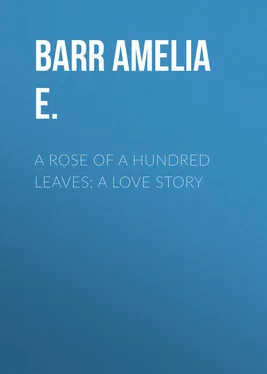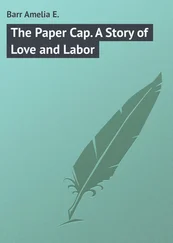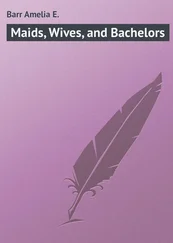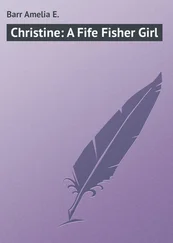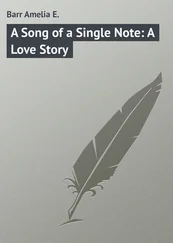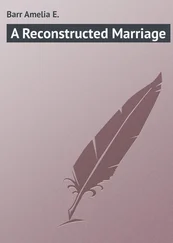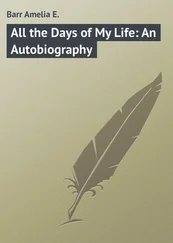Amelia Barr - A Rose of a Hundred Leaves - A Love Story
Здесь есть возможность читать онлайн «Amelia Barr - A Rose of a Hundred Leaves - A Love Story» — ознакомительный отрывок электронной книги совершенно бесплатно, а после прочтения отрывка купить полную версию. В некоторых случаях можно слушать аудио, скачать через торрент в формате fb2 и присутствует краткое содержание. Жанр: foreign_prose, Зарубежные любовные романы, на английском языке. Описание произведения, (предисловие) а так же отзывы посетителей доступны на портале библиотеки ЛибКат.
- Название:A Rose of a Hundred Leaves: A Love Story
- Автор:
- Жанр:
- Год:неизвестен
- ISBN:нет данных
- Рейтинг книги:4 / 5. Голосов: 1
-
Избранное:Добавить в избранное
- Отзывы:
-
Ваша оценка:
- 80
- 1
- 2
- 3
- 4
- 5
A Rose of a Hundred Leaves: A Love Story: краткое содержание, описание и аннотация
Предлагаем к чтению аннотацию, описание, краткое содержание или предисловие (зависит от того, что написал сам автор книги «A Rose of a Hundred Leaves: A Love Story»). Если вы не нашли необходимую информацию о книге — напишите в комментариях, мы постараемся отыскать её.
A Rose of a Hundred Leaves: A Love Story — читать онлайн ознакомительный отрывок
Ниже представлен текст книги, разбитый по страницам. Система сохранения места последней прочитанной страницы, позволяет с удобством читать онлайн бесплатно книгу «A Rose of a Hundred Leaves: A Love Story», без необходимости каждый раз заново искать на чём Вы остановились. Поставьте закладку, и сможете в любой момент перейти на страницу, на которой закончили чтение.
Интервал:
Закладка:
“It is so fortunate,” she said, “that Ulfar has found a little out-of-the-way girl to appreciate his great beauty. The world at present does not think much of masculine beauty. A handsome fellow who starts for any of its prizes is judged to be frivolous and poetical, perhaps immoral: you see Byron’s beauty made him unfit for a legislator, he could do nothing but write poetry. I should say it was Ulfar’s best card to marry this innocent with the queer name: with his face and figure, he will never get into Parliament. No one would trust him with taxes. He is born to make love, and he and his country Phyllis can go simpering and kissing through life together. If I were interested in Ulfar – ”
“You are interested in Ulfar, Sarah,” interrupted Elizabeth. “You said so to me last night.”
“Did I? Nevertheless, life does not give us time really to question ourselves, and it is the infirmity of my nature to mistake feeling for evidence.”
“You must not change your opinions so quickly, Sarah.”
“It is often an element of success to change your opinions. It is hesitating among a variety of views that is fatal. The man who does not know what he wants is the man who is held cheap.”
“I am sure I know what I want, Sarah.” And as he spoke, Ulfar looked with intelligence at the fair widow, and in answer she shot from her bright blue eyes a bolt of summer lightning that set aflame at once the emotional side of Ulfar’s nature.
“You say strange things, Sarah. I wish it was possible to understand you.”
“‘Who shall read the interpretation thereof?’ is written on everything we see, especially on women.”
“I believe,” said Elizabeth, “that Ulfar has quarrelled with his country maid. Is there a quarrel, Ulfar, really?”
“No,” he answered, with some temper.
Sarah nodded at Ulfar, and said softly: “The absent must be satisfied with the second place. However, if you have quarrelled with her, Ulfar, turn over a new leaf. I found that out when poor Sandys was alive. People who have to live together must blot a leaf now and then with their little tempers. The only thing is to turn over a new one.”
“If anything unpleasant happens to me,” said Ulfar, “I try to bury it.”
“You cannot do it. The past is a ghost not to be laid; and a past which is buried alive, it is terrible.” It was Sarah who spoke, and with a sombre earnestness not in keeping with her usual character. There was a minute’s pregnant silence, and it was broken by the entrance of a servant with a letter. He gave it to Ulfar.
It was Aspatria’s sorrowful, questioning note. Written while Brune waited, it was badly written, incorrectly constructed and spelled, and generally untidy. It had the same effect upon Ulfar that a badly dressed, untidy woman would have had. He was ashamed of the irregular, childish scrawl. He did not take the trouble to put himself in the atmosphere in which the anxious, sorrowful words had been written. He crushed the paper in his hand with much the same contemptuous temper with which Elizabeth had seen him treat a dunning letter. She knew, however, that this letter was from Aspatria, and, saying something about her father, she went into an adjoining room, and left Ulfar and Sarah together. She thought Sarah would be the proper alterative.
The first words Sir Thomas Fenwick uttered regarded Aspatria. Turning his head feebly, he asked: “Has Ulfar quarrelled with Miss Anneys? I hear nothing of her lately.”
“I think he is tired of his fancy for her. There is no quarrel.”
“She was a good girl, – eh? Kindhearted, beautiful, – eh, Elizabeth?”
“She certainly was.”
He said no more then; but at midnight, when Ulfar was sitting beside him, he called his son, and spoke to him on the subject. “I am going – almost gone – the way of all flesh, Ulfar. Take heed of my last words. You promised to make Miss Anneys your wife, – eh?”
“I did, father.”
“Do not break your promise. If she gives it back to you, that might be well; but you cannot escape from your own word and deed. Honour keeps the door of the house of life. To break your word is to set the door wide open, – open for sorrow and evil of all kinds. Take care, Ulfar.”
The next day he died, and one of Ulfar’s first thoughts was that the death set him free from his promise for one year at the least. A year contained a multitude of chances. He could afford to write to Aspatria under such circumstances. So he answered her letter at once, and it seemed proper to be affectionate, preparatory to reminding her that their marriage was impossible until the mourning for Sir Thomas was over. Also death had softened his heart, and his father’s last words had made him indeterminate and a little superstitious. A clever woman of the world would not have believed in this letter; its aura – subtle but persistent, as the perfume of the paper – would have made her doubt its fondest lines. But Aspatria had no idea other than that certain words represented absolutely certain feelings.
The letter made her joyful. It brought back the roses to her cheeks, the spring of motion to her steps. She began to work in her room once more. Now and then her brothers heard her singing the old song she had sung so constantly with Ulfar, —
“A shepherd in a shade his plaining made,
Of love, and lovers’ wrong,
Unto the fairest lass that trod on grass,
And thus began his song:
‘Restore, restore my heart again,
Which thy sweet looks have slain,
Lest that, enforced by your disdain, I sing,
Fye! fye on love! It is a foolish thing!
“‘Since love and fortune will, I honour still
Your dark and shining eye;
What conquest will it be, sweet nymph, to thee,
If I for sorrow die?
Restore, restore my heart again,
Which thy sweet looks have slain,
Lest that, enforced by your disdain, I sing,
Fye! fye on love! It is a foolish thing!’”
But the lifting of the sorrow was only that it might press more heavily. No more letters came; no message of any kind; none of the pretty love-gages he delighted in giving during the first months of their acquaintance. A gloom more wretched than that of death or sickness settled in the old rooms of Seat-Ambar. William and Brune carried its shadow on their broad, rosy faces into the hay-fields and the wheat-fields. It darkened all the summer days, and dulled all the usual mirth-making of the ingathering feasts. William was cross and taciturn. He loved his sister with all his heart, but he did not know how to sympathize with her. Even mother-love, when in great anxiety, sometimes wraps itself in this unreasonable irritability. Brune understood better. He had suffered from a love-change himself; he knew its ache and longing, its black despairs and still more cruel hopes. He was always on the lookout for Aspatria; and one day he heard news which he thought would interest her. Lady Redware was at the Hall. William had heard it a week before, but he had not considered it prudent to name the fact. Brune had a kinder intelligence.
Конец ознакомительного фрагмента.
Текст предоставлен ООО «ЛитРес».
Прочитайте эту книгу целиком, купив полную легальную версию на ЛитРес.
Безопасно оплатить книгу можно банковской картой Visa, MasterCard, Maestro, со счета мобильного телефона, с платежного терминала, в салоне МТС или Связной, через PayPal, WebMoney, Яндекс.Деньги, QIWI Кошелек, бонусными картами или другим удобным Вам способом.
Читать дальшеИнтервал:
Закладка:
Похожие книги на «A Rose of a Hundred Leaves: A Love Story»
Представляем Вашему вниманию похожие книги на «A Rose of a Hundred Leaves: A Love Story» списком для выбора. Мы отобрали схожую по названию и смыслу литературу в надежде предоставить читателям больше вариантов отыскать новые, интересные, ещё непрочитанные произведения.
Обсуждение, отзывы о книге «A Rose of a Hundred Leaves: A Love Story» и просто собственные мнения читателей. Оставьте ваши комментарии, напишите, что Вы думаете о произведении, его смысле или главных героях. Укажите что конкретно понравилось, а что нет, и почему Вы так считаете.
